Reinvigorate Your Soil: Unleashing the Power of Fertile Ground with Mobile Chicken Tractors
Are you struggling to maintain fertile, healthy soil on your farm? Countless farmers face this challenge, finding their soil worn out and nutrient-deficient, leading to hampered crop yields. It’s a dilemma that can turn any green-thumbed joy into a frustrating grind.
You deserve fertile, thriving soil that supports bountiful crops. And that’s where Mobile Chicken House comes in. With years of expertise in building portable, efficient, and automated chicken coops, we’re here to help you harness the power of mobile chicken tractors to enhance soil health.
In this blog post, we’ll dive into what a mobile chicken tractor is, why soil health is crucial, common challenges in maintaining it, and how these innovative coops can revitalize your ground.
Ready to boost your fertility and productivity? Let’s get started!
What Is a Mobile Chicken Tractor?
Let’s start with the basics. What exactly is a chicken tractor?
Imagine a portable, lightweight structure, often with wheels, designed to house chickens. The key features are its mobility, ease of use, and the protection it offers to your feathered friends. You can easily move it around your property, giving your chickens access to fresh grass and insects, contributing to their health and egg production.
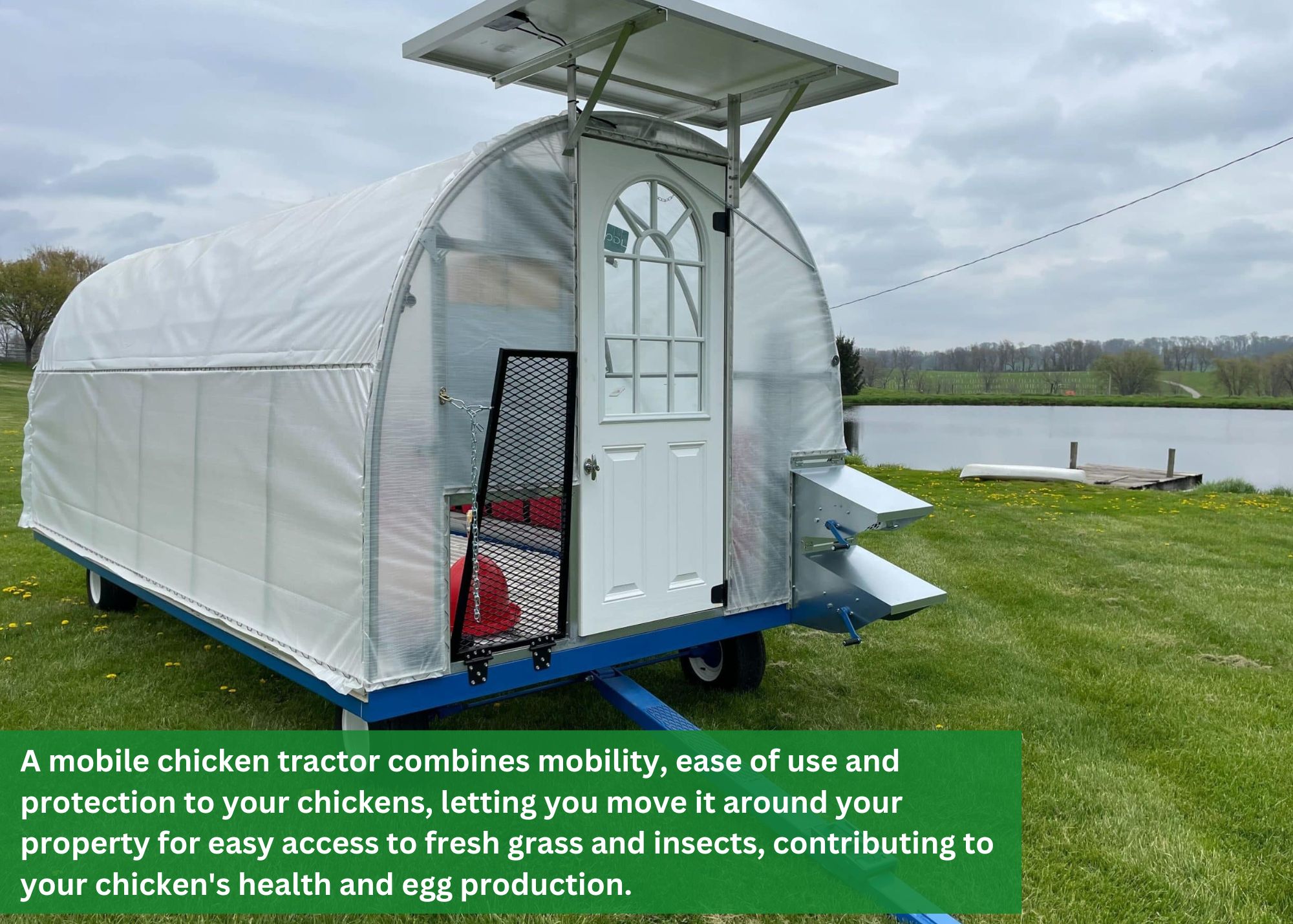
Why consider a mobile chicken tractor? Because it seamlessly combines the benefits of free-range farming with ease of maintenance. This provides your chickens with a healthy environment and ensures your pastures remain nutrient-rich.
Curious to know more about mobile chicken tractors and their various designs? Check out our detailed guide on the different types of mobile chicken tractors, or take a look at the mobile chicken houses we sell to see detailed descriptions and tips for choosing the perfect fit for your farming needs.
Why Does Soil Health Matter?
But why is soil health so important in the first place?
Healthy soil is the foundation of any successful farming and gardening operation. It is filled with tiny living organisms that help break down organic matter, cycle nutrients, and support plant growth. Soil is like a powerhouse: it provides essential nutrients for plants, holds water, gives structure for roots to stay anchored, and serves as a home for helpful microbes.
Soil health is also intrinsically linked to a thriving ecosystem. It supports biodiversity, leads to better crop yields, and promotes sustainable farming practices. We’ve covered the importance of sustainable farming practices in our blog “Striking the Perfect Balance: Boosting Egg Production Sustainably on Your Farm.”
In summary, poor soil health leads to:
- Reduced crop yields
- Increased susceptibility to pests and diseases
- Higher costs for fertilizers and amendments
- More significant erosion and loss of topsoil
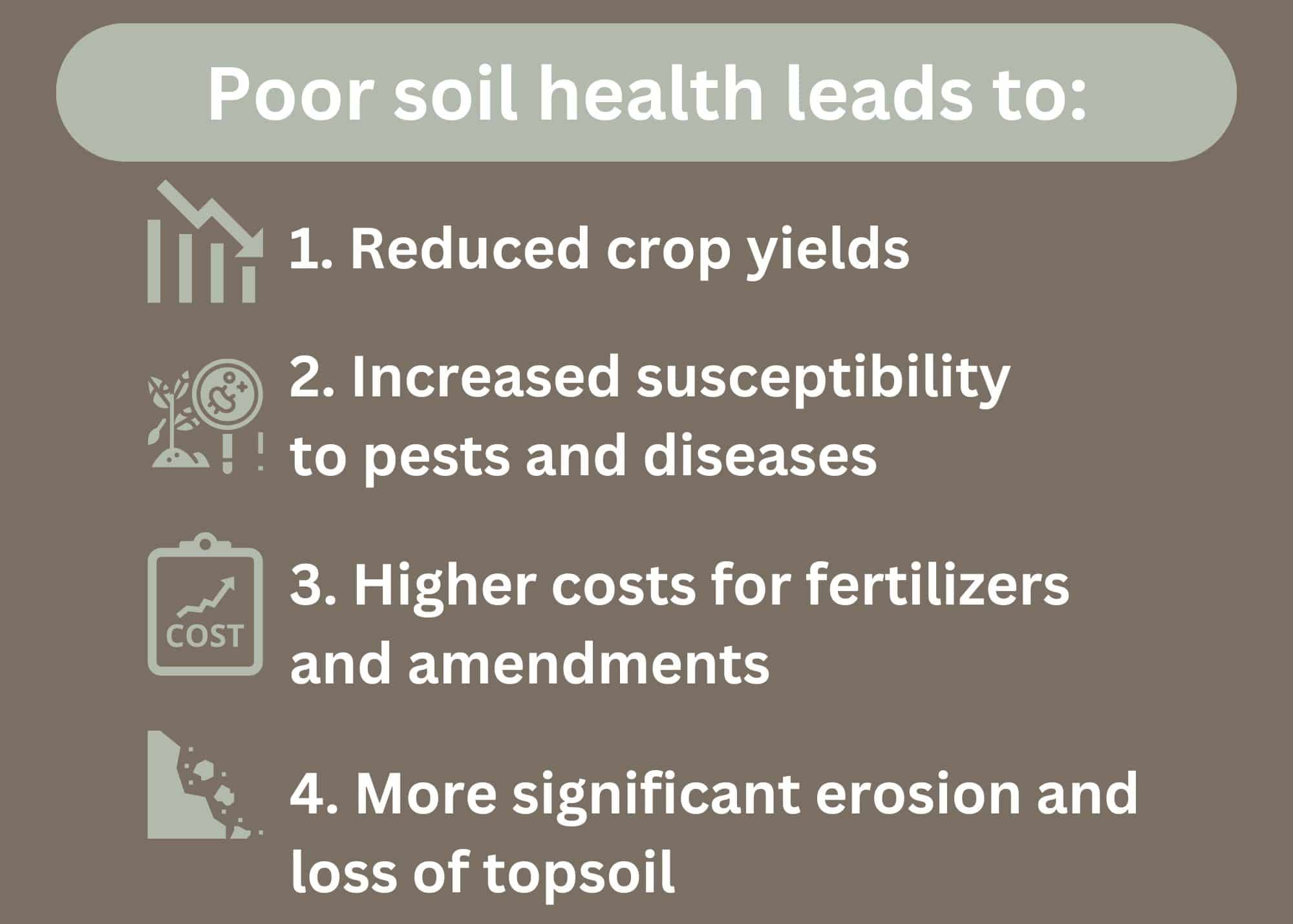
Neglecting soil health can lead to many problems that put your farm’s sustainability and profitability at risk.
Understanding Soil Health
To fully grasp the concept of soil health, we need to delve into its composition.
Soil is made up of sand, silt, clay, and organic matter. Soil health encompasses various aspects, including its physical structure, chemical composition, and biological activity.
Here’s a breakdown of each component:
1. Physical Structure:
- Soil texture and composition (sand, silt, clay)
- Soil porosity and compaction
- Water infiltration and retention capabilities
2. Chemical Composition:
- Nutrient levels (nitrogen, phosphorus, potassium)
- pH levels and soil acidity
- Presence of toxic elements
3. Biological Activity:
- Population and diversity of soil organisms (bacteria, fungi, earthworms)
- Organic matter content
- Soil respiration and nutrient cycling processes
Each of these elements plays a vital role in maintaining a fertile environment where plants can thrive. An imbalance in any of these areas can lead to soil degradation, reducing its ability to support healthy crops.
Regularly testing your soil is essential to maintain its health. Various tools and techniques are available to help you conduct these tests accurately. You can also look for visual signs of healthy soil, like robust root growth, a crumbly texture, and a rich, dark color.
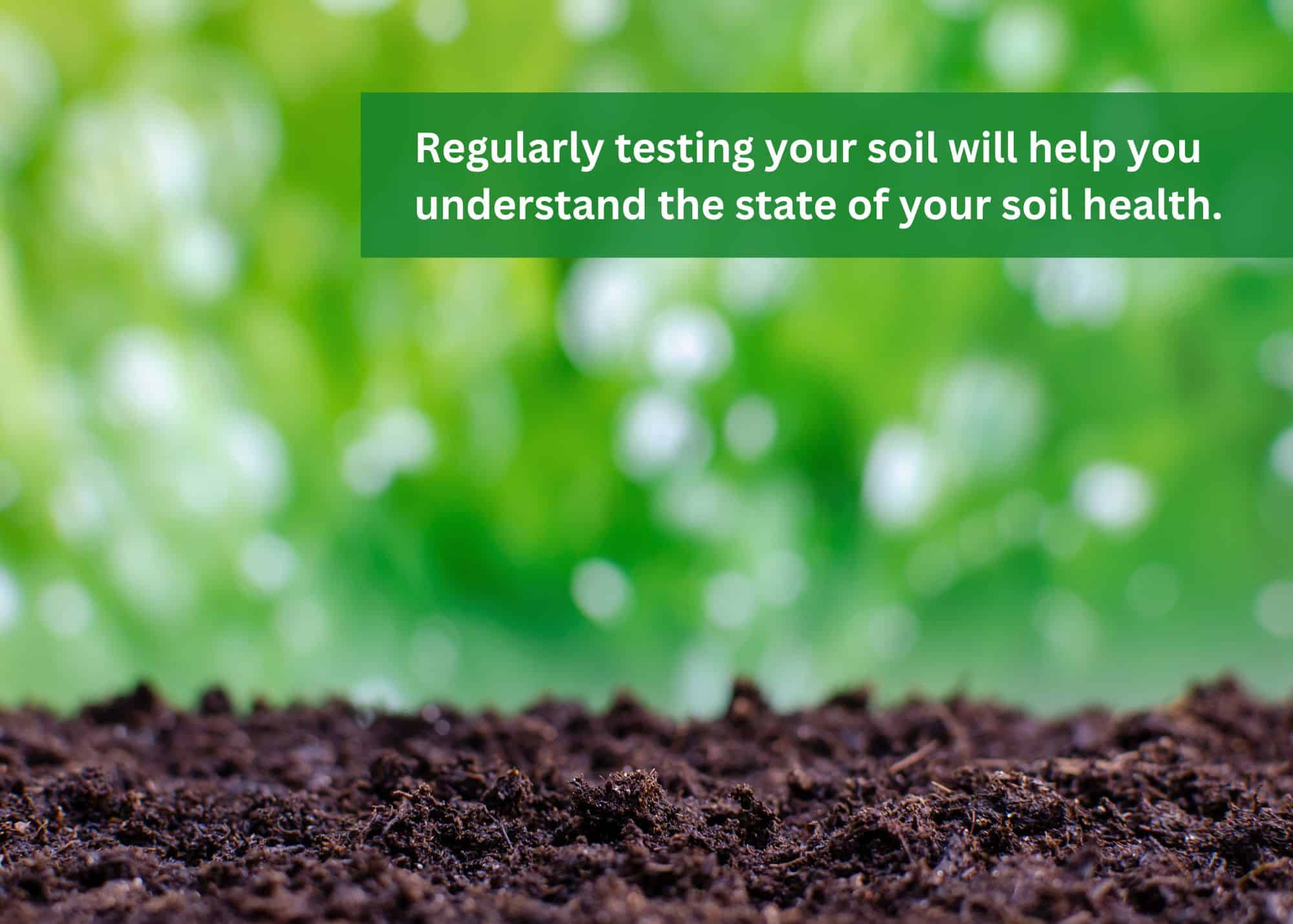
Common Challenges in Maintaining Soil Health
Maintaining soil health is an ongoing challenge for many farmers. Some of the most common issues include:
- Soil Erosion: Wind and water can erode the topsoil, depleting nutrients and organic matter. This is particularly problematic on exposed, bare ground.
- Nutrient Deficiency: Intensive farming practices can lead to the depletion of essential nutrients. Fertilizers may offer a temporary fix but can further degrade soil health over time.
- Compaction: Heavy machinery and livestock can compact soil, reducing aeration and water infiltration. This makes it harder for plants to establish deep roots.
- Salinization: Improper irrigation practices can lead to the buildup of salts in the soil. This buildup negatively impacts plant growth.
- Decreased Microbial Activity: Pesticides and chemical runoff can kill beneficial soil microorganisms. This disrupts nutrient cycling and organic matter decomposition.
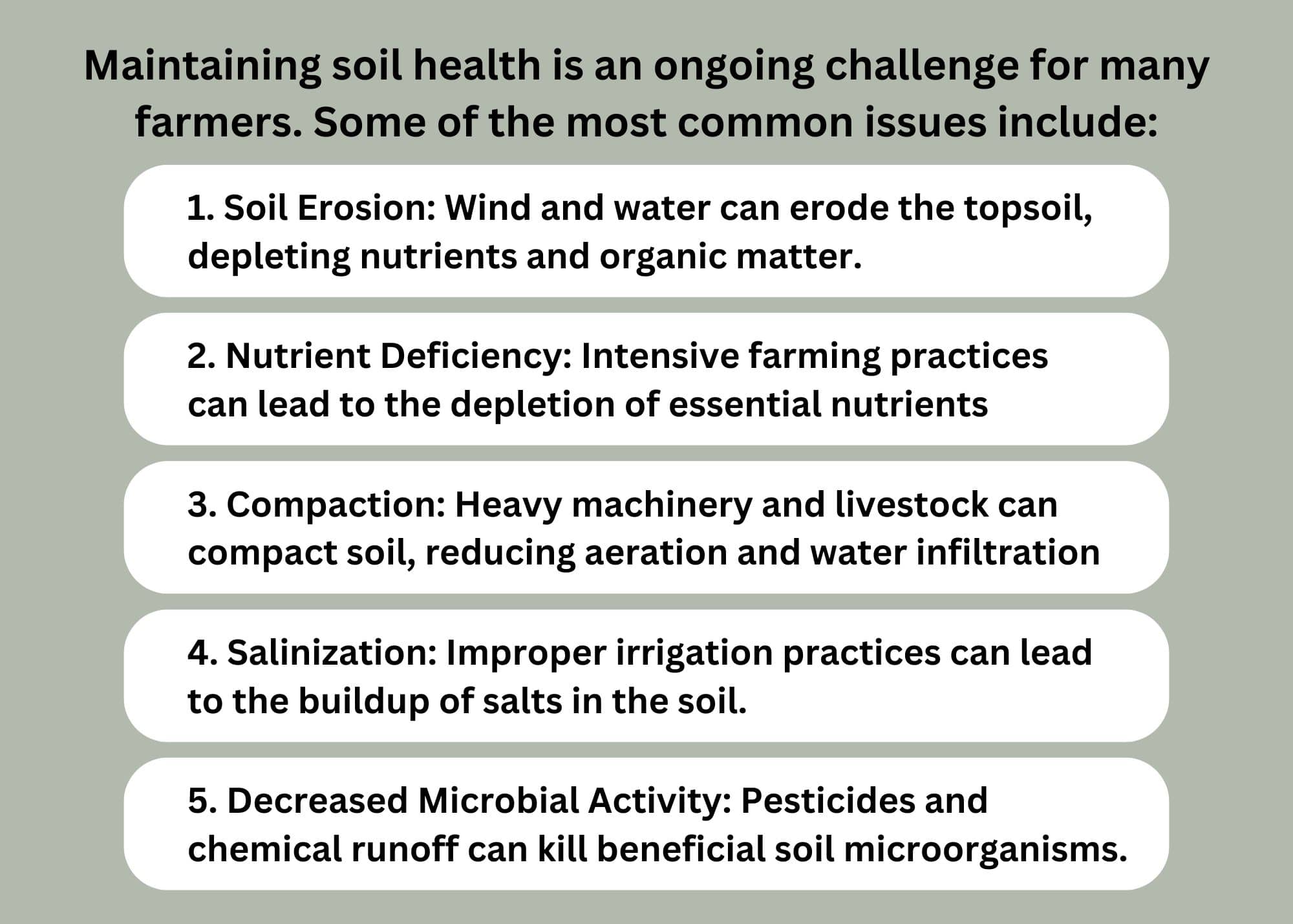
So, how can you rejuvenate and maintain healthy soil on your farm? The answer lies in utilizing a mobile chicken tractor, a solution that can relieve these common challenges.
How Mobile Chicken Tractors Benefit Soil Health
Now, let’s see how mobile chicken tractors can help us overcome these challenges and the numerous benefits they offer to dramatically improve soil health.
1. Even Manure Distribution:
- Chicken tractor systems allow for the controlled distribution of manure. As you move the tractor, your chickens naturally fertilize the ground with their manure. This adds essential nutrients to the soil, such as nitrogen, phosphorus, and potassium.
2. Enhanced Soil Aeration:
- Chickens instinctively scratch and peck at the ground, a behavior that helps in soil aeration. This process breaks up compacted layers, improving water infiltration and root growth.
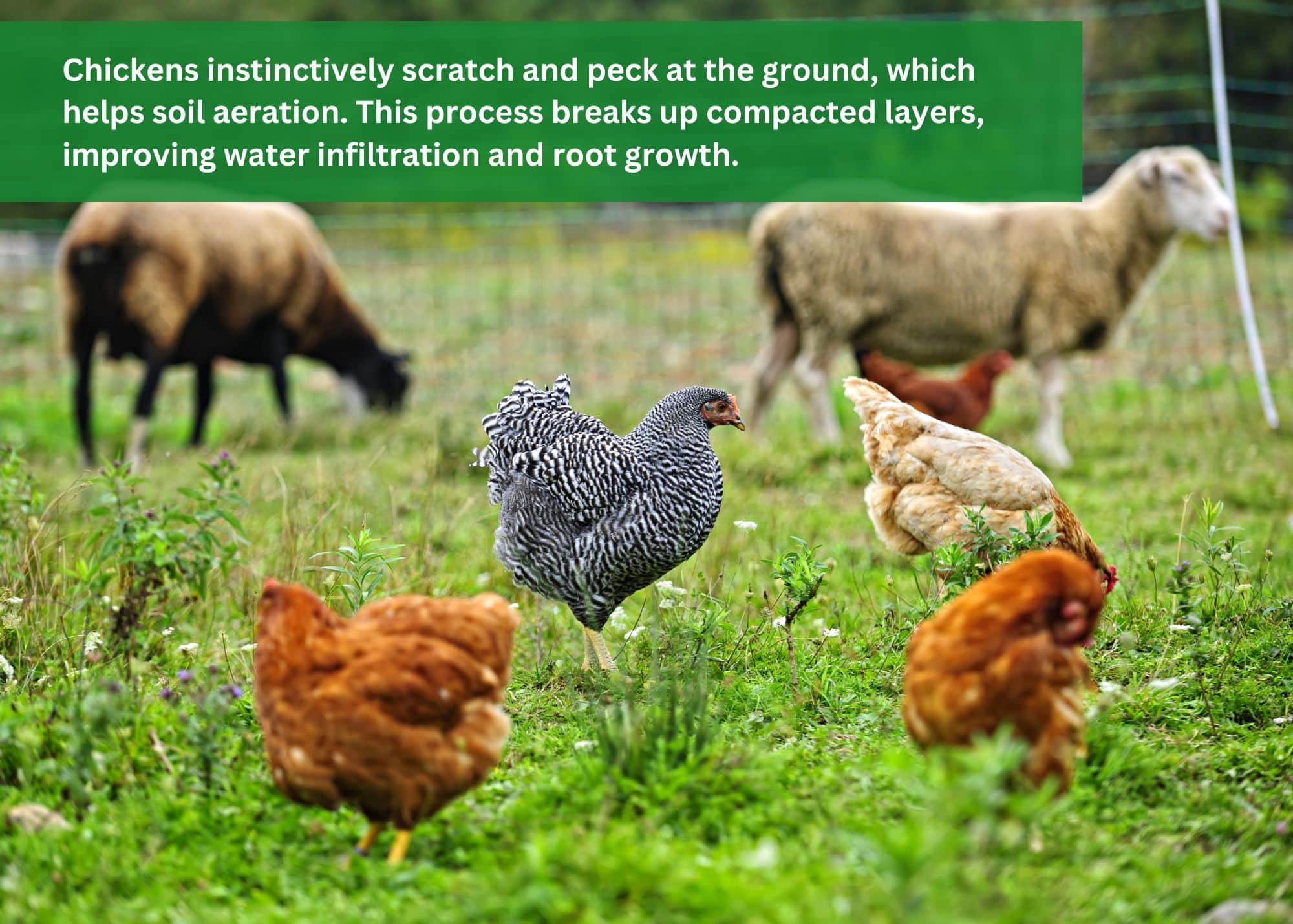
3. Increased Microbial Activity:
- The addition of organic matter from manure boosts microbial activity. This supports the decomposition of organic material and the cycling of nutrients, resulting in a healthier, more dynamic ecosystem.
4. Pest Control:
- Chickens feed on grubs. This reduces pest populations naturally without chemical pesticides, as grubs can destroy grass. Allowing chickens to feed on grubs helps to contribute to a more balanced soil ecosystem while providing the birds with a high-protein source of food.
5. Pasture Improvement:
- Regularly moving the chicken tractor prevents overgrazing and allows pastures to regenerate. This rotational grazing practice makes sure each section of the pasture has time to recover and stay healthy to keep growing well.
6. Reduction in Soil Erosion:
- Mobile chicken tractors mitigate the risk of soil erosion by continually covering the ground with plant matter and manure. This covering acts as a protective layer against wind and rain.
Putting It All Together
Using a mobile chicken tractor on your farm can greatly improve soil health. By taking advantage of the natural behaviors of chickens, you can foster a nutrient-rich, biologically active, and resilient soil environment.
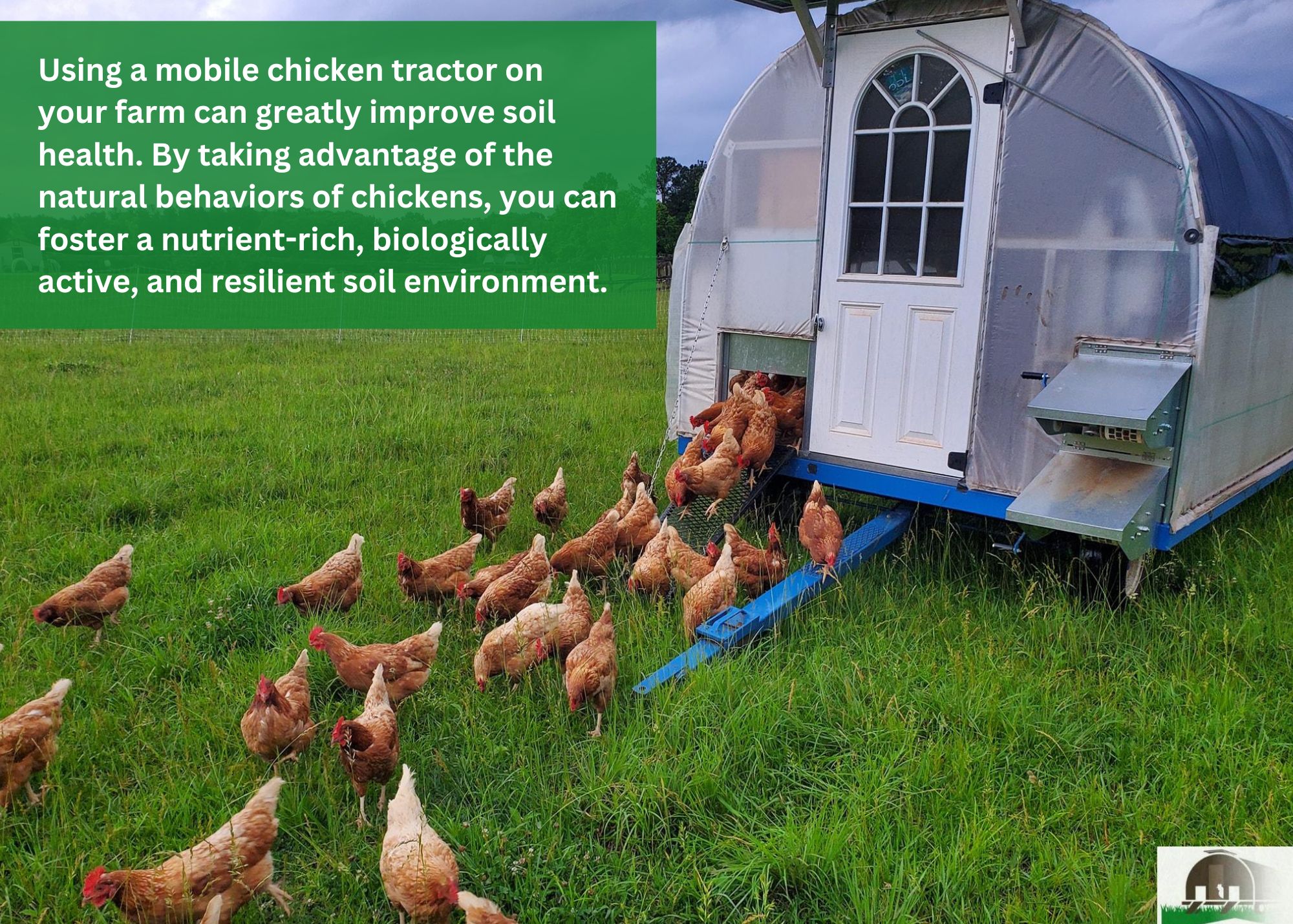
That is an accomplishment that makes any farmer proud.
One of the most significant advantages of using mobile chicken tractors is reduced labor. Plus, you’ll require fewer artificial fertilizers and pesticides. This makes your farm management more efficient and environmentally friendly.
To fully utilize the power of mobile chicken tractors, implement a rotation schedule. Regularly move the tractor to different areas, allowing the soil to recover and build its natural fertility.
For best results, balance your flock size with the area covered by the tractor. This ensures your chickens have enough space to forage and the soil isn’t over-fertilized. You might need to make seasonal adjustments to your rotation schedule based on weather and soil conditions.
For tips on how to get the best behavior from your chickens with mobile tractors, read “The Ultimate Guide to Training Your Chickens for a Mobile Chicken House.”
Final Thoughts
Revamping your soil health doesn’t have to be an uphill battle. Mobile chicken tractors provide a natural and sustainable way to maintain soil fertility, reducing the need for synthetic fertilizers and pesticides. These versatile tools merge effortless chicken care with effective soil management.
Ready to take your farm’s soil health to the next level? At The Mobile Chicken House, we specialize in designing and building innovative chicken coops that can be shipped across all lower 48 states.
If you’re ready to unlock the potential of your soil, consider adding these powerful coops into your farm’s regimen.
For more tips and insights, don’t forget to check out our other blog posts, like our guide on Preparing Your Flock for a Comfortable Winter.
Give us a call today to order your coop! We look forward to hearing from you.





